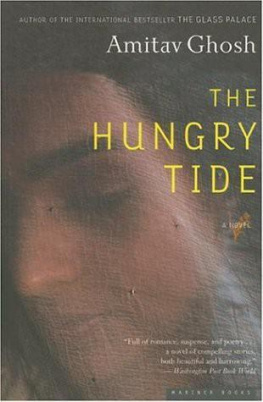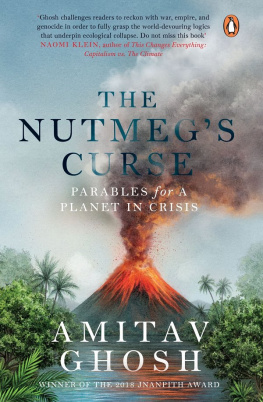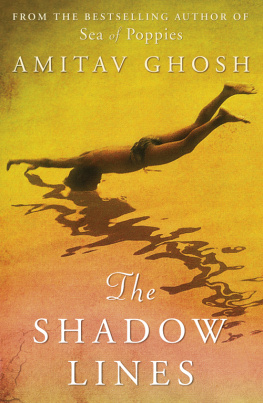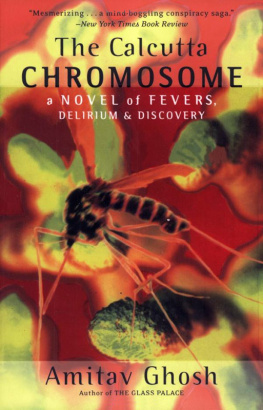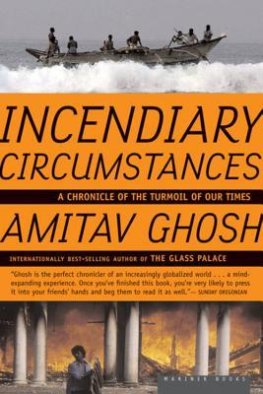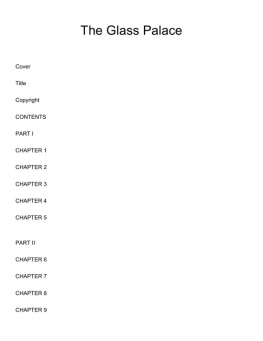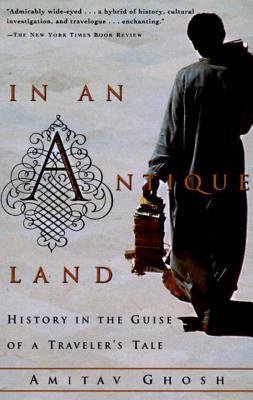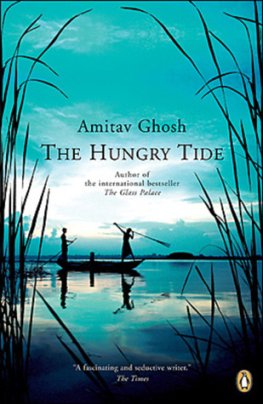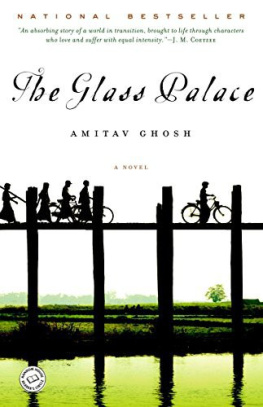Amitav Ghosh - The Hungry Tide: A Novel
Here you can read online Amitav Ghosh - The Hungry Tide: A Novel full text of the book (entire story) in english for free. Download pdf and epub, get meaning, cover and reviews about this ebook. year: 2006, publisher: Mariner Books, genre: Detective and thriller. Description of the work, (preface) as well as reviews are available. Best literature library LitArk.com created for fans of good reading and offers a wide selection of genres:
Romance novel
Science fiction
Adventure
Detective
Science
History
Home and family
Prose
Art
Politics
Computer
Non-fiction
Religion
Business
Children
Humor
Choose a favorite category and find really read worthwhile books. Enjoy immersion in the world of imagination, feel the emotions of the characters or learn something new for yourself, make an fascinating discovery.
- Book:The Hungry Tide: A Novel
- Author:
- Publisher:Mariner Books
- Genre:
- Year:2006
- Rating:5 / 5
- Favourites:Add to favourites
- Your mark:
- 100
- 1
- 2
- 3
- 4
- 5
The Hungry Tide: A Novel: summary, description and annotation
We offer to read an annotation, description, summary or preface (depends on what the author of the book "The Hungry Tide: A Novel" wrote himself). If you haven't found the necessary information about the book — write in the comments, we will try to find it.
The Hungry Tide: A Novel — read online for free the complete book (whole text) full work
Below is the text of the book, divided by pages. System saving the place of the last page read, allows you to conveniently read the book "The Hungry Tide: A Novel" online for free, without having to search again every time where you left off. Put a bookmark, and you can go to the page where you finished reading at any time.
Font size:
Interval:
Bookmark:
PENGUIN CANADA
THE HUNGRY TIDE
AMITAV GHOSH was born in Calcutta in 1956 and raised and educated in Bangladesh, Sri Lanka, Iran, Egypt, India, and the United Kingdom, where he received his Ph.D. in social anthropology from Oxford. Acclaimed for fiction, travel writing, and journalism, his books include The Circle of Reason, The Shadow Lines, In an Antique Land, and Dancing in Cambodia. His previous novel, The Glass Palace, sold more than a half-million copies in Britain. The Hungry Tide has been sold for translation in twelve foreign countries and is also a bestseller abroad. Ghosh has won Frances Prix Medici Etranger, Indias prestigious Sahitya Akademi Award, the Arthur C. Clarke Award, and the Pushcart Prize. He divides his time between New York and Calcutta, and is a visiting scholar at Harvard University.
Other books by Amitav Ghosh
THE GLASS PALACE
THE CALCUTTA CHROMOSOME
THE SHADOW LINES
IN AN ANTIQUE LAND
THE CIRCLE OF REASON
Amitav Ghosh
THE HUNGRY TIDE

PENGUIN CANADA
Published by the Penguin Group
Penguin Group (Canada), 90 Eglinton Avenue East, Suite 700, Toronto, Ontario, Canada M4P 2Y3 (a division of Pearson Canada Inc.)
Penguin Group (USA) Inc., 375 Hudson Street, New York, New York 10014, U.S.A.
Penguin Books Ltd, 80 Strand, London WC2R 0RL, England
Penguin Ireland, 25 St Stephens Green, Dublin 2, Ireland (a division of Penguin Books Ltd)
Penguin Group (Australia), 250 Camberwell Road, Camberwell, Victoria 3124, Australia (a division of Pearson Australia Group Pty Ltd)
Penguin Books India Pvt Ltd, 11 Community Centre, Panchsheel Park, New Delhi 110 017, India
Penguin Group (NZ), 67 Apollo Drive, Rosedale, North Shore 0632, Auckland, New Zealand (a division of Pearson New Zealand Ltd)
Penguin Books (South Africa) (Pty) Ltd, 24 Sturdee Avenue, Rosebank, Johannesburg 2196, South Africa
Penguin Books Ltd, Registered Offices: 80 Strand, London WC2R 0RL, England
Published in Penguin Canada paperback by Penguin Group (Canada), a division of Pearson Canada Inc., 2005.
Simultaneously published in the U.S.A. with Houghton Mifflin Company, 215 Park Avenue South,
New York, NY 10003. Originally published in 2004 in the U.K. by HarperCollins Publishers, 7785
Fulham Palace Road, Hammersmith, London W68JB.
(WEB) 10 9 8 7 6 5 4 3 2
Copyright Amitav Ghosh, 2004
Lines from Duino Elegies and the Sonnets to Orpheus by Rainer Maria Rilke, translated by A. Poulin, Jr. Copyright 1975, 1976, 1977 by A. Poulin, Jr. Reprinted by permission of Houghton Mifflin Company.
All rights reserved.
All rights reserved. Without limiting the rights under copyright reserved above, no part of this publication may be reproduced, stored in or introduced into a retrieval system, or transmitted in any form or by any means (electronic, mechanical, photocopying, recording or otherwise), without the prior written permission of both the copyright owner and the above publisher of this book.
Publishers note: This book is a work of fiction. Names, characters, places and incidents either are the product of the authors imagination or are used fictitiously, and any resemblance to actual persons living or dead, events, or locales is entirely coincidental.
Book design by Melissa Lotfy
Map by Jacques Chazaud
Manufactured in Canada.
LIBRARY AND ARCHIVES CANADA CATALOGUING IN PUBLICATION
Ghosh, Amitav
The hungry tide / Amitav Ghosh.
ISBN 0-14-301557-5
I. Title.
PR9499.3.G535H85 2005 823.914 C2004-905402-3
ISBN-13: 978-0-14-301557-4
ISBN-10: 0-14-301557-5
British Library Cataloguing in Publication data available
American Library of Congress Cataloging in Publication data available
Visit the Penguin Group (Canada) website at www.penguin.ca
Special and corporate bulk purchase rates available; please see
www.penguin.ca/corporatesales or call 1-800-399-6858, ext. 477 or 474
For Lila
Part One
The Ebb: Bhata

THE TIDE COUNTRY
K ANAI SPOTTED HER the moment he stepped onto the crowded platform: he was deceived neither by her close-cropped black hair nor by her clothes, which were those of a teenage boy loose cotton pants and an oversized white shirt. Winding unerringly through the snack vendors and tea sellers who were hawking their wares on the stations platform, his eyes settled on her slim, shapely figure. Her face was long and narrow, with an elegance of line markedly at odds with the severity of her haircut. There was no bindi on her forehead and her arms were free of bangles and bracelets, but on one of her ears was a silver stud, glinting brightly against the sun-deepened darkness of her skin.
Kanai liked to think that he had the true connoisseurs ability to both praise and appraise women, and he was intrigued by the way she held herself, by the unaccustomed delineation of her stance. It occurred to him suddenly that perhaps, despite her silver ear stud and the tint of her skin, she was not Indian, except by descent. And the moment the thought occurred to him, he was convinced of it: she was a foreigner; it was stamped in her posture, in the way she stood, balancing on her heels like a flyweight boxer, with her feet planted apart. Among a crowd of college girls on Kolkatas Park Street she might not have looked entirely out of place, but here, against the sooty backdrop of the commuter station at Dhakuria, the neatly composed androgyny of her appearance seemed out of place, almost exotic.
Why would a foreigner, a young woman, be standing in a south Kolkata commuter station, waiting for the train to Canning? It was true, of course, that this line was the only rail connection to the Sundarbans. But so far as he knew it was never used by tourists the few who traveled in that direction usually went by boat, hiring steamers or launches on Kolkatas riverfront. The train was mainly used by people who did daily-passengeri, coming in from outlying villages to work in the city.
He saw her turning to ask something of a bystander and was seized by an urge to listen in. Language was both his livelihood and his addiction, and he was often preyed upon by a near-irresistible compulsion to eavesdrop on conversations in public places. Pushing his way through the crowd, he arrived within earshot just in time to hear her finish a sentence that ended with the words train to Canning? One of the onlookers began to explain, gesticulating with an upraised arm. But the explanation was in Bengali and it was lost on her. She stopped the man with a raised hand and said, in apology, that she knew no Bengali: Ami Bangla jani na. He could tell from the awkwardness of her pronunciation that this was literally true: like strangers everywhere, she had learned just enough of the language to be able to provide due warning of her incomprehension.
Kanai was the one other outsider on the platform and he quickly attracted his own share of attention. He was of medium height and at the age of forty-two his hair, which was still thick, had begun to show a few streaks of gray at the temples. In the tilt of his head, as in the width of his stance, there was a quiet certainty, an indication of a well-grounded belief in his ability to prevail in most circumstances. Although his face was otherwise unlined, his eyes had fine wrinkles fanning out from their edges but these grooves, by heightening the mobility of his face, emphasized more his youth than his age. Although he was once slight of build, his waist had thickened over the years but he still carried himself lightly, and with an alertness bred of the travelers instinct for inhabiting the moment.
Next pageFont size:
Interval:
Bookmark:
Similar books «The Hungry Tide: A Novel»
Look at similar books to The Hungry Tide: A Novel. We have selected literature similar in name and meaning in the hope of providing readers with more options to find new, interesting, not yet read works.
Discussion, reviews of the book The Hungry Tide: A Novel and just readers' own opinions. Leave your comments, write what you think about the work, its meaning or the main characters. Specify what exactly you liked and what you didn't like, and why you think so.

